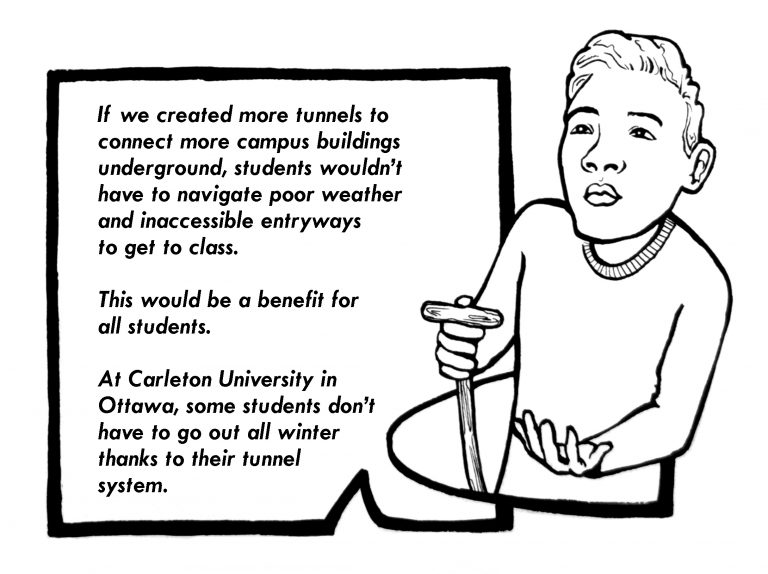6 Spaces and Environments (Built and Virtual)
 Spark: A Centre for Social Research Innovation
Spark: A Centre for Social Research Innovation
Spark: A Centre for Social Research Innovation is on a learning and accessibility journey to make all Spark mediums, both virtual and in-person, compliant with the Accessibility for Ontarians with Disabilities Act (AODA). We needed help and so many experts from across McMaster came together to assist us. We would like to acknowledge and thank everyone who consulted with the Spark communications team and provided their expert advice, resources, training, and time. With their help, we hired a student accessibility lead and began to improve the captions on all our seminars/training to make them more accessible. We have just begun, and have lots more to do, but wanted to share our positive and collaborative experience, and thank those at McMaster who have come together on a mission of accessibility.
Thank you to McMaster experts: Kate Brown, Jessica Blackwood, Katherine Hesson-Bolton, Nancy Waite, Paige Maylott, and Nick Marquis for all your help on this journey!
Contributors: Allison Van (Spark Executive Director), Spark’s Communications Team (Equity Burke, Lynn Holland, Celine Keomany, Jacob Sloots,), also Kate Brown, Jessica Blackwood, Katherine Hesson-Bolton, Nancy Waite, Paige Maylott, and Nick Marquis
Improving Accessibility in McMaster’s Housing & Conference Services
Housing & Conference Services (HCS) continually invests in creating inclusive experiences for our residence students, guests, and staff. This past year, HCS units have continued to plan their work through an accessibility and disability inclusion lens with the belief that it improves the outcome for everyone. All HCS senior leadership has now completed training through HR on hiring with an Equity-based lens. Four members of this team are now also trained as Equity, Diversity, and Inclusion (EDI) ambassadors.
Accessibility in our campus footprint is continuously improving. This past year, Brandon Hall has received extensive wayfinding updates. These new signs will become the new residence standard with high-contrast designs and universal icons for comprehension. This summer, we added an accessible seasonal outdoor space called Collab Cabanas for McMaster staff and faculty use. Additionally, our communications team has recently undertaken WCAG 2.1 international web accessibility guidelines digital accessibility training and is making our digital footprint more accessible.
Contributors: Housing and Conference Services
Applying for Canada’s Enabling Accessibility Fund to Enhance Building Accessibility at McMaster
McMaster University applied for the Employment and Social Development Canada’s Enabling Accessibility Fund (EAF) for mid-sized projects in July 2021. The proposed project was for making the Campus Services Building (CSB) accessible with the addition of an elevator, ramp, barrier-free washrooms, and accessible reception area. The CSB houses the offices of Facility Services, Human Resources, and the Career Service Centre. This building is currently not accessible. The total project cost is estimated to be $2 million (based on estimates obtained from contractors), and the EAF grant applied for is $1 million. The application process was led by Facility Services in coordination with the Equity and Inclusion Office, McMaster Accessibility Council, and with support from various McMaster community members. McMaster expects to hear from the National Grants and Contributions Delivery Centre in early 2022. We are hopeful for a positive outcome as we continue our efforts of building an inclusive community here on campus.
Contributors: George Vadakken (Facility Services)
ALTITUDE Team Building and Climbing Program
The Alpine Tower, Indoor Climbing Wall, and Team Development Course hosted by the Department of Athletics and Recreation create the ideal setting for fostering teambuilding, improving communication, and developing self-esteem. These ALTITUDE facilities provide Universal Access for persons of all abilities. To access this service, connect with Wayne Terryberry.
Contributors: The Department of Athletics and Recreation
Improving Accessibility in the Libraries
While 2021 has been challenging for Library Accessibility Services staff as we continue to work from home, and miss our colleagues and students, the time has provided us with an opportunity to grow the footprint of the Campus Accessible Tech Space (CATS) in Mills Library. Early in 2022, a newly redesigned and significantly expanded accessible study area will open for student use. The new CATS space will include individual, group, and silent study spaces, and provide additional de-stressing areas.
We have spent 2020-21 focused on improving accessibility within the libraries. These projects include our staff accessibility learning program, accessible databases initiative, and wrapping up our captioning project. The goal of our staff accessibility learning program is to provide library-specific accessibility training so all staff has opportunities to learn about writing alt-text, checking for colour contrast, and writing descriptive hyperlinks, among other topics.
Our accessible database initiative will provide:
- information for users on the accessibility features of library databases; and
- allow patrons to refine their searches to databases that offer features such as tagged PDFs or captions.
The captioning project, which nears completion, aims to identify a film’s captioning status, seek permission to caption those without captions, and record this information within the library catalog. This will ensure library users know what captions are immediately available, which captions will take longer, and those that are only available as part of an accommodation.
We have also worked to improve our professional development. Library Accessibility Staff has attended the Guelph Accessibility Conference, Scholars Portal Day, the Microsoft Accessibility Conference, and several events and conferences on campus. In addition to these unique educational opportunities, we continue to contribute our expertise on several accessibility committees, both on and off-campus.
Contributors: Library Accessibility Services
Improving Accessibility in the Archives & Research Collections
Our remote work environment meant that a portion of staff and student employee time the Library would have dedicated to staffing physical locations or managing physical collections could be redirected. We allocated some of this time to working with our extensive and growing digitized collections to make them more discoverable and accessible. Over the course of the pandemic months, library staff has transcribed approximately 4,000 pages of handwritten archival documents. Being handwritten materials, these documents previously had no Optimal Character Recognition (OCR) text equivalent, and with only an image file available, were inaccessible to students and researchers using screen readers, or other technology to access our digital collections. Additionally, library staff has reviewed and corrected the machine-generated OCR text files for 27 of our digitized rare books (at least 5,000 pages of text) to provide improved access to these special materials.
Contributors: Archives & Research Collections Area of the Library
The Student Success Centre: Creating Accessible Virtual Events
Virtual events and programs became a necessity in 2020 due to restrictions on in-person gatherings. The Student Success Centre leveraged multiple platforms to offer accessible, creative virtual event experiences, and programs with synchronous and asynchronous elements to allow as many students as possible to participate, including students in different time zones.
Some examples:
- Welcome Week (September 2020) took place on the Presence platform, with more than 200 events and asynchronous activities.
- Mac’s Money Centre’s tax program (March 2021) used a combination of virtual appointments and safe tax drop-off locations to provide students and community members with tax preparation services.
- Mac101 (July 2021) and the International Student Summer Webinar Series (Summer 2021) used Echo360 to house webinar recordings for asynchronous participation.
Contributors: Jacqueline Hampshire, Elizabeth DiEmanuele, Catherine Martin, Michele Corbeil, and Rachel Nelson (Student Success Centre)

